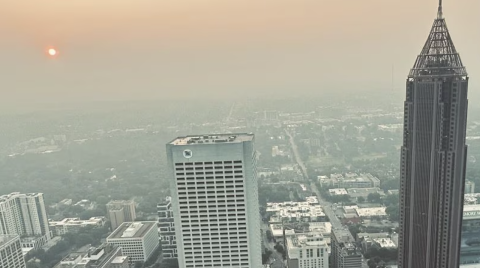Georgia Tech experts, including Zachary Handlos of the School of Earth and Atmospheric Sciences, keep watch for dangerous air quality issues in Atlanta spurred by smoke from hundreds of wildfires ablaze in Canada.
(This story was first published in the Georgia Tech News Center. Read the full news story here.)
Atlanta is seeing some of the worst air quality in the nation, and the culprit is actually thousands of miles away.
More than 900 wildfires blazing in Canada are creating smoke and dust particles that are being carried by the jet stream all the way down to the Deep South. Georgia Tech scientists and researchers are watching closely.
Wildfires themselves aren’t uncommon. But what is different and, at times, dangerous is the number of particles in the air.
“It is unusual to experience high concentrations of smoke aerosols within the contiguous U.S. such as what we have been observing recently,” said Zachary Handlos, meteorologist and senior academic professional in the School of Earth and Atmospheric Sciences at Georgia Tech.
Fine particulate matter (also known as PM2.5) levels exceeded 55 micrograms per cubic meter of air south of Atlanta. This is the reason for the recent air quality alerts, which indicated that the air quality in metro Atlanta sat in the orange zone Monday and Tuesday, meaning the air has been potentially hazardous for the most at-risk people.
Older persons, pregnant women, young children, and anyone with preexisting health conditions are among the most vulnerable populations. However, anyone can be affected by poor air quality.
PM2.5 is fine enough to penetrate deep into the lungs,” said Talat Odman, principal research engineer and air quality expert from the Georgia Tech School of Civil and Environmental Engineering.
Both Odman and Handlos say an N95 mask can be a big help in filtering out this particulate matter. Read more.

